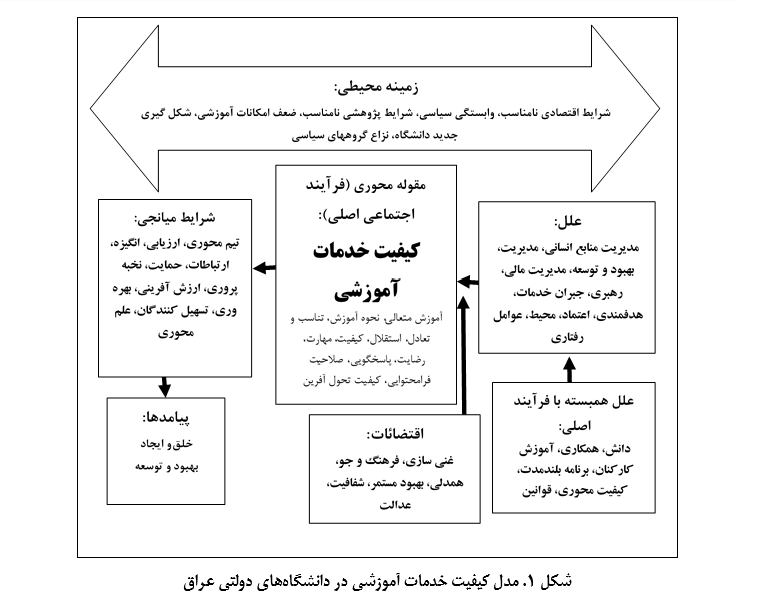ارائه الگوی کیفیت خدمات آموزشی با رویکرد منابع انسانی در دانشگاههای دولتی کشور عراق با استفاده از رویکرد داده بنیاد
کلمات کلیدی:
الگوی کیفیت خدمات آموزشی, دانشگاه های دولتی , کشور عراق , خانواده شش سیچکیده
دانشگاهها باید اصول کیفیت آموزشی را رعایت کنند تا بتوانند به جامعه خدمت نمایند تا بتوانند بهبودهایی قابل توجه در کشورها ایجاد نمایند. لذا هدف این پژوهش ارائه الگوی کیفیت خدمات آموزشی در دانشگاههای دولتی عراق میباشد. بدین منظور از فلسفه تفسیری، رویکرد کیفی، استراتژی داده بنیاد با رویکرد ظهور یابنده و روش تحلیل، تحلیل مضمون مبتنی بر رویکرد کدگذاری گلیزری استفاده شده است. جامعه مورد مطالعه این پژوهش، خبرگان دانشگاههای دولتی کشور عراق هستند. خزانه کیفی این پژوهش، شامل مدیران و خبرگانی از دانشگاههای منتخب است که آگاهی تئوری و عملی در زمینه موضوع مورد مطالعه داشته، احاطه و تسلط کافی نسبت به فرآیندهای کیفیت خدمات داشته باشند و آنرا در قسمتهای مختلف تجربه کرده باشند. نمونه مورد مطالعه نیز 21 نفر از افرادی هستند که حداقل ۸ سال سابقه کار مرتبط و آگاهی کامل از فرآیندهای کیفیت خدمات آموزشی داشته باشند. به منظور انجام نمونهگیری از نمونهگیری نظری استفاده شد. قابلیت اعتماد یافتههای این پژوهش(روایی و پایایی) نیز از طریق چهار معیار گوبا و لینکلن که شامل اعتبارپذیری، انتقال پذیری، قابلیت اطمینان، تاییدپذیری است، انجام شد. به منظور کدگذاری از درمرحله کدگذاری حقیقی و نظری بهره گرفته شد. به منظور کدگذاری نظری از خانواده «شش سی» گلیزر استفاده شد. لذا علل ایجادکننده کیفیت خدمات آموزشی شامل مدیریت منابع انسانی، مدیریت بهبود و توسعه، مدیریت مالی، رهبری، جبران خدمات، هدفمندی، اعتماد، محیط و عوامل رفتاری همچنین عوامل همبسته شامل دانش، همکاری، آموزش کارکنان، برنامه بلندمدت، کیفیت محوری، قوانین و شرایط میانجی شامل تیم محوری، ارزیابی، انگیزه، ارتباطات، حمایت، نخبه پروری، ارزش آفرینی، بهره وری، تسهیل کنندگان و علم محوری همچنین عوامل تعدیلگر شامل غنی سازی، فرهنگ و جو، همدلی، بهبود مستمر، شفافیت و عدالت و پیامدها شامل بهبود و توسعه و خلق و ایجاد میباشد. نتایج نشان داد بکارگیری مولفههای مدل میتواند دانشگاههای دولتی عراق را به دانشگاههایی با سطوح بالاتر کیفیت آموزشی برساند تا در آینده پیشرفت بهتری در دانشگاهها و سطح علمی جامعه حاصل آید.
دانلودها
مراجع
Bezi A, Fakoori H, Bayani AA, Saemi H. Design and Validation of an Environmental Education Curriculum Model for Higher Education Based on the "Aker" Approach. Iranian Journal of Educational Sociology. 2024;7(1):79-90. doi: 10.61838/kman.ijes.7.1.8.
Rukhiran M, Wong-In S, Netinant P. IoT-Based Biometric Recognition Systems in Education for Identity Verification Services: Quality Assessment Approach. Ieee Access. 2023;11:22767-87. doi: 10.1109/access.2023.3253024.
Miller S, Parker L. Quality and evaluation challenges in higher education online learning: A systematic review. Journal of Educational Technology Systems. 2024;53(1):1-16. doi: 10.1177/00472395211013745.
Marzuki SN, Muljan M, Haslinda H, Affandi L. Soft Skill and Hard Skill Development Model in Improving the Quality of Human Resources in the Higher Education Environment. QALAMUNA: Jurnal Pendidikan, Sosial, dan Agama. 2024;16(1):571-82. doi: 10.37680/qalamuna.v16i1.5070.
Mahardhani AJ. The Role of Public Administration in Improving the Quality of Education Services in Primary Schools. Indo-Mathedu Intellectuals Journal. 2023;4(2):1370-81. doi: 10.54373/imeij.v4i2.363.
Mahmoudi M. Assessing the quality of e-learning services using the fuzzy SERVQUAL approach. Higher Education Letter. 2022;15(57):57-86.
Uzair-ul-Hassan M. An Analysis of Fairness and Quality Issues in Online Assessment at Higher Education in Pakistan. Pakistan Journal of Humanities and Social Sciences. 2023;11(4). doi: 10.52131/pjhss.2023.1104.0713.
Tekel E, Su A. Access versus Quality Trade-off: How Citizen-Centered Is the Public Policy Making in the Expansion of the Turkish Higher Education System? Citizen-Centered Public Policy Making in Turkey2023. p. 385-404.
Yousefi M, Jahantab Z, Khadem Rezayan M. Educational service quality in a type 1 medical university based on the SERVQUAL model from the perspective of faculty members of various affiliated schools. Development Strategies in Medical Education. 2021;8(3):1-10. doi: 10.52547/dsme.8.3.1.
El Alfy S, Abukari A. Revisiting perceived service quality in higher education: Uncovering service quality dimensions for postgraduate students. Journal of Marketing for Higher Education. 2020;30(1):1-25. doi: 10.1080/08841241.2019.1648360.
Phonthanukitithaworn C, Wongsaichia S, Naruetharadhol P, Thipsingh S, Senamitr T, Ketkaew C. Managing educational service quality and loyalty of international students: A case of international colleges in Thailand. Cogent Social Sciences. 2022;8(1). doi: 10.1080/23311886.2022.2105929.
Sibai MT, Bay Jr B, Dela Rosa R. Service Quality and Student Satisfaction Using ServQual Model: A Study of a Private Medical College in Saudi Arabia. International Education Studies. 2021;14(6):51-8.
Ramdhani MA, Maylawati DS, Priatna T, Sugilar H. Service Quality Parameters of E-Learning in Higher Education. 2021. doi: 10.2991/assehr.k.210715.030.
Wu H, Lin H. A Hybrid Approach to Develop an Analytical Model for Enhancing the Service Quality of E-learning. Computers & Education. 2021;58(4):1318-38. doi: 10.1016/j.compedu.2011.12.025.
Dai DN, Khoi BH, Lam NH, Van Chuong N, editors. The Relationship Among Education Service Quality, University Reputation and Behavioral Intention in Vietnam. International Econometric Conference of Vietnam; 2019: Springer, Cham.
Satuti JR, Sunaryanto S, Nuris DM. Does Student Satisfaction Mediate the Correlation Between E-Learning Service Quality, Academic Engagement and Academic Achievement? Jabe (Journal of Accounting and Business Education). 2020;5(1):38. doi: 10.26675/jabe.v5i1.12699.
Golabchi H, Kiaee M, Kameli MJ. Designing a Superior Service Delivery Model in Education to Enhance Public Satisfaction. Iranian Journal of Educational Sociology. 2024;7(1):189-97. doi: 10.61838/kman.ijes.7.1.18.
Stribbell H, Duangekanong S. Satisfaction as a key antecedent for word of mouth and an essential mediator for service quality and brand trust in international education. Humanities and Social Sciences Communications. 2022;9(1):438. doi: 10.1057/s41599-022-01459-z.
Ali M, Amir H, Ahmed M. The role of university switching costs, perceived service quality, perceived university image and student satisfaction in shaping student loyalty. Journal of Marketing for Higher Education. 2021:1-22. doi: 10.1080/08841241.2021.1975184.

دانلود
چاپ شده
ارسال
بازنگری
پذیرش
شماره
نوع مقاله
مجوز
حق نشر 2025 نشریه پژوهش و نوآوری در تربیت و توسعه

این پروژه تحت مجوز بین المللی Creative Commons Attribution-NonCommercial 4.0 می باشد.










